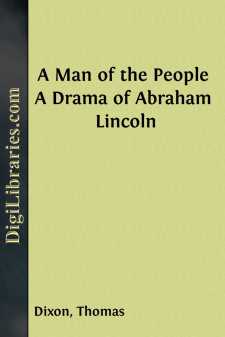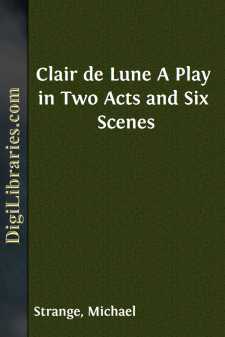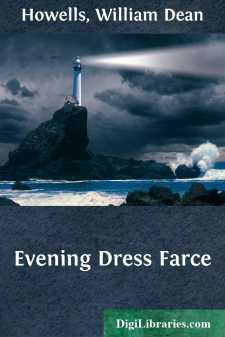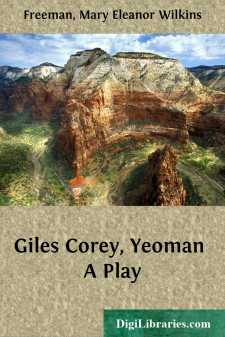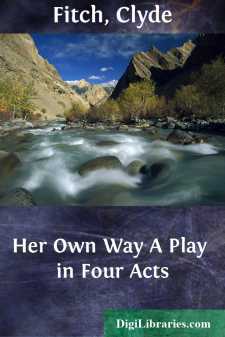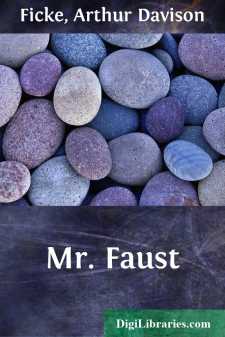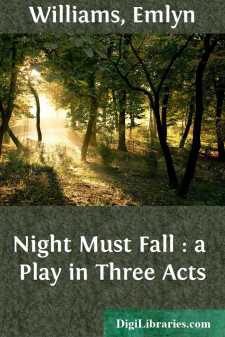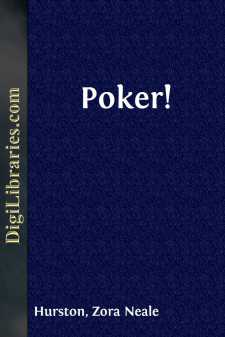Drama
American Books
Sort by:
Mrs. Campbell: "Now this, I think, is the most exciting part of the whole affair, and the pleasantest." She is seated at breakfast in her cottage at Summering-by-the-Sea. A heap of letters of various stylish shapes, colors, and superscriptions lies beside her plate, and irregularly straggles about among the coffee-service. Vis-à-vis with her sits Mr. Campbell behind a newspaper. "How...
more...
by:
Thomas Dixon
HISTORICAL NOTE While the popular conception of Lincoln as the Liberator of the Slave is true historically, there is a deeper view of his life and character. He was the savior, if not the real creator, of the American Union of free Democratic States. His proclamation of emancipation was purely an incident of war. The first policy of his administration was to save the Union. To this fact we owe a united...
more...
by:
Michael Strange
Act I Scene 1 [An old park with avenues of trees leading away in all directions. Directly in background of stage there is a sheet of water fringed by willow and poplar trees. On the right and left is a high box hedge formed in curves with the top clipped in grotesque shapes mostly of birds. A statue is placed in the centre of each hedge, and beneath the statues are seats. When the curtain rises several...
more...
Mrs. Edward Roberts: "Now, my dear, Amy and I will get there early, so as to make up for your coming a little late, but you must be there for the last half, at least. I would excuse you altogether if I could, for I know you must be dead tired, up all night, that way, on the train, but Mrs. Miller is one of those people who never can listen to reason, and she would take deadly offence if you missed...
more...
by:
Gertrude Stein
One evening in the winter, some years ago, my brother came to my rooms in the city of Chicago bringing with him a book by Gertrude Stein. The book was called and, just at that time, there was a good deal of fuss and fun being made over it in American newspapers. I had already read a book of Miss Stein's called and had thought it contained some of the best writing ever done by an American. I was...
more...
Act I. Scene I.—Salem Village. Living-room in Giles Corey's house. Olive Corey is spinning. Nancy Fox, the old servant, sits in the fireplace paring apples. Little Phœbe Morse, on a stool beside her, is knitting a stocking. Phœbe (starting). What is that? Oh, Olive, what is that? Nancy. Yes, what is that? Massy, what a clatter! Olive (spinning). I heard naught. Be not so foolish, child. And...
more...
by:
Clyde Fitch
The nursery. Half-past two in the afternoon. A cool, delightful white room, with a frieze of children playing in the ocean spray; shelves of bright-colored books on the walls, and the months of a large calendar by Elizabeth Shippen Green framed underneath. There is a deep bow-window at the back; the principal door is at the Left, and a smaller one on the Right. Toys of all sizes, for all ages, are...
more...
INTRODUCTION Through all the work of Arthur Davison Ficke runs a note of bigness that compels attention even when one feels that he is still groping both for form and thought. In "Mr. Faust" this note has assumed commanding proportions, while at the same time the uncertainty manifest in some of the earlier work has almost wholly disappeared. Intellectually as well as artistically, this play...
more...
by:
Emlyn Williams
ACT I The sitting-room of Forest Corner, MRS. BRAMSON'S _bungalow in a forest in Essex, A fine morning in October. Centre back, a small hall; in its left side the front door of the house (throughout the play, "left" and "right" refer to the audience's left and right). Thick plush curtains can be drawn across the entrance to the hall; they are open at the moment. Windows, one...
more...
SCENE— A shabby front room in a shotgun house. A door covered by dingy portieres upstage C. Small panel window in side Wall L. Plain centre table with chairs drawn up about it. Gaudy calendars on wall. Battered piano against wall R. Kerosene lamp with reflector against wall on either side of room. At rise of curtain NUNKIE is at piano playing…. Others at table with small stacks of chips before each...
more...



